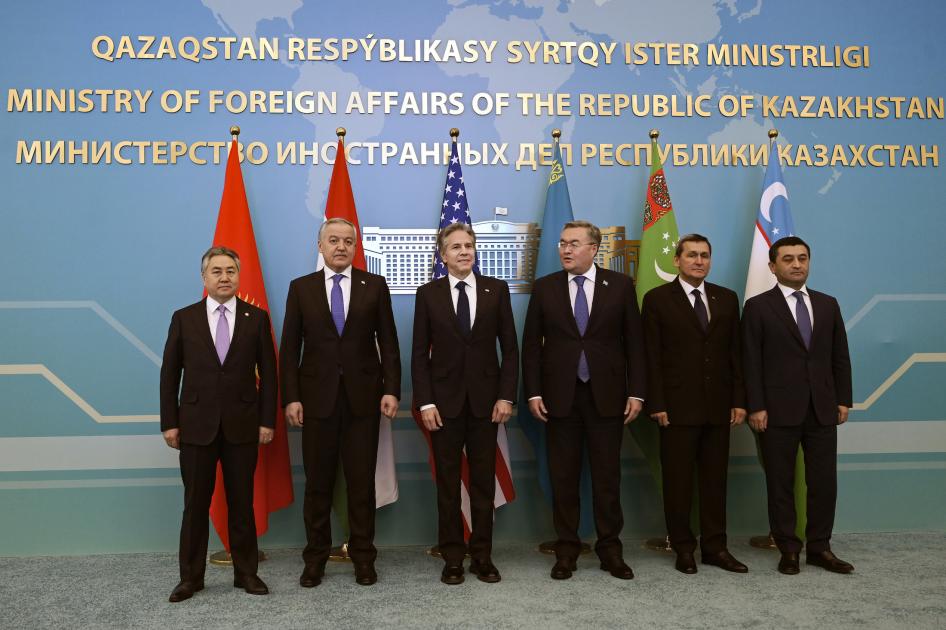(New York, September 18, 2023) – United States President Joe Biden should put human rights at the center of planned talks with the five Central Asian leaders on the sidelines of the United Nations General Assembly on Tuesday, September 19, Human Rights Watch said today.
While Russia’s invasion of Ukraine has triggered renewed focus on this strategically important, resource-rich region, Biden should not allow this to eclipse urgent human rights concerns. The meeting will be the first by a US president with the five Central Asian presidents.
Both the US and European Union have been urging Central Asian governments to resist efforts by Moscow to use trade routes through Central Asia to evade sanctions triggered by its full-scale invasion of Ukraine.
“As the US and EU look to strengthen ties with Central Asia following Russia’s escalation of its war on Ukraine, they should seek guarantees on fundamental standards of the rule of law and human rights,” said Iskra Kirova, Europe and Central Asia advocacy director at Human Rights Watch. “Biden should ask for explicit steps to end politically motivated prosecutions, suppression of free speech, and impunity for torture and police brutality.”
In Kazakhstan, over 18 months have passed since the January 2022 protests accompanied by a cascade of human rights violations, including excessive use of force against protesters, arbitrary arrests and detention, and ill-treatment and torture of detainees. At least 238 people were killed in the protests and hundreds of people alleged ill-treatment and torture in detention in the aftermath of the violence.
Kazakhstan’s government has yet to effectively investigate the loss of life and other abuses and hold those responsible to account. The US should insist on an independent investigation and accountability for the human rights violations that took place and not let Kazakhstan’s “bloody January” drop from the agenda.
Kyrgyzstan is rapidly moving away from its one-time status as the most vibrant space for civil society and media in the region. Kyrgyz authorities have initiated a series of repressive laws and measures restricting the operations of media and civil society. These include the adoption of an overly broad law on “false information” and a Russian-style law that prohibits “LGBT propaganda,” among other things. Both laws give authorities wide discretion to interfere with media content and operations.
Draft laws on nongovernmental organizations and mass media may affect the ability of civil society to secure funding, and they would allow government broad powers of oversight of groups’ activities and lead to closure of independent media. A spate of criminal cases – particularly the deportation of a journalist, Bolot Temirov, to Russia and a lawsuit and potential closure of one of the few independent online outlets, Kloop.kg – have sent a chilling message to dissenting voices in the country.
The government of Tajikistan has intensified its crackdown on human rights and fundamental freedoms. It violently repressed peaceful gatherings in the Gorno Badakshan Autonomous Oblast (GBAO) over 2021-2022, uses trumped-up charges against human rights defenders and journalists in retaliation for their professional activities, and has disbanded en masse many of the country’s civil society organizations. The US should raise the dire human rights situation and seek concrete progress before they deepen bilateral relations.
Turkmenistan remains one of the most closed and repressive countries in the world. The change in leadership in 2022 has not brought improvement in its dire human rights situation. Even though several people imprisoned on politically motivated charges were recently freed under the annual presidential amnesty, many remain behind bars.
One of them – Nurgeldi Halykov, a freelance correspondent – was sentenced to four years on fabricated fraud charges for sending a photo to the independent outlet Turkmen.news of the World Health Organization’s 2020 visit to Turkmenistan. The government refuses to renew expiring passports for Turkmen citizens living abroad – in contravention to international law – in an effort to force them to return to the country.
In Uzbekistan, despite President Shavkat Mirziyoyev’s claims, the authorities are no longer pursuing a political reform agenda. Evidence of this is Mirziyoyev’s reelection, absent any competition, and the constitutional amendments that allowed him to run and potentially remain in power for the next 14 years.
Promised legislative reforms have stalled, while restrictions on media and politically motivated prosecutions of bloggers and journalists have increased. Added to this is the lack of accountability for the authorities’ heavy-handed response to protests in the autonomous region of Karakalpakstan in July 2022, in which at least 21 people died and hundreds were badly injured.
“The readiness of the Central Asian leaders to join this meeting is an opportunity for President Biden to make clear what genuine partnerships based on fundamental human rights standards would look like,” Kirova said. “What is at stake is the region’s long-term stability if the legitimate rights and aspirations of many citizens across Central Asia are not guaranteed.”







